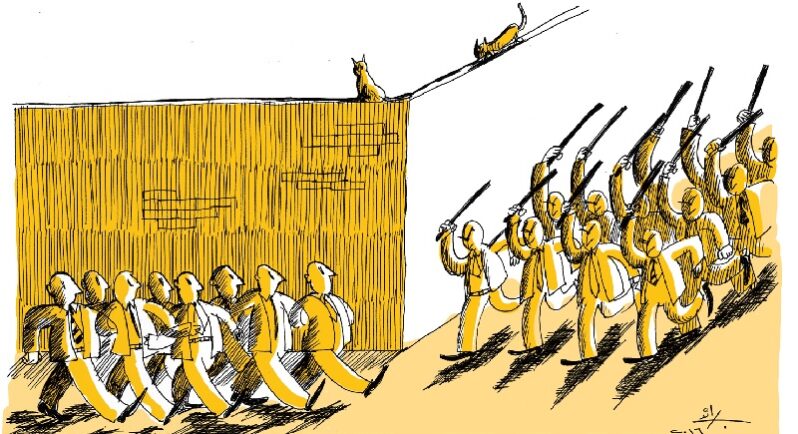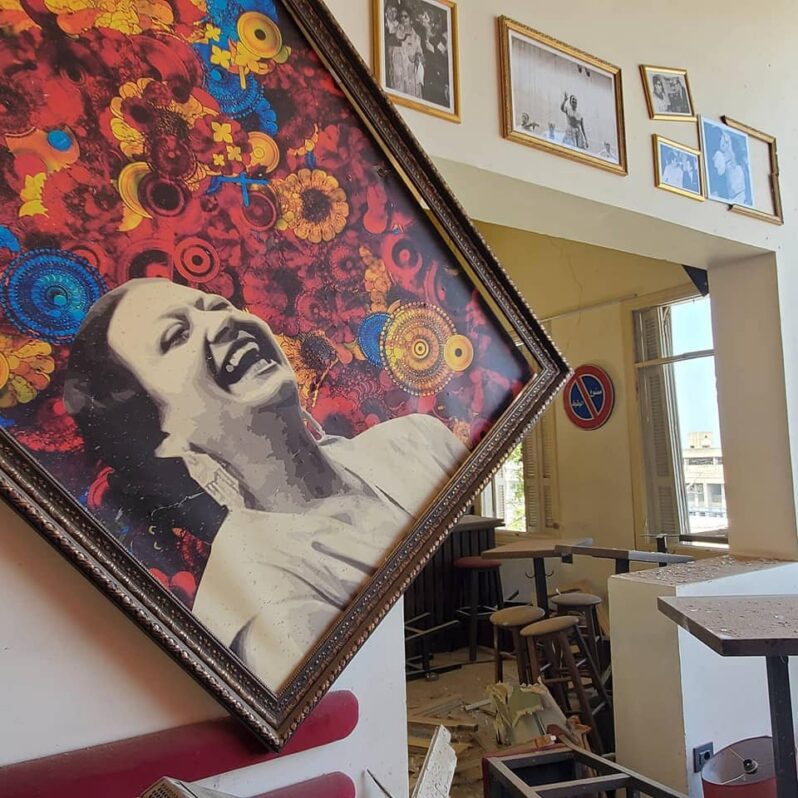Lawyering in Egypt: Regulation and Reform

The Bar Association is the largest syndicate in Egypt. More than 700,000 lawyers are registered in it – a huge number in relation to Egypt’s labor market and population. The law profession has long suffered problems such as attacks on lawyers by security forces, and the violation of the right of defense before certain courts and prosecution offices.[1] A debate is also occurring over the role of lawyers, the current labor market’s need for this number of them, and what kinds are needed. There is also debate about the Bar Association’s role in defending lawyers, protecting their interests, preparing young lawyers for the labor market, and other matters.
For years, debates have been occurring over the great increase in the number of lawyers and the need to reduce it; especially because many law graduates have a Bar Association membership but do not engage in any form of legal practice. Previously, a number of lawyers stated that the Bar Association’s rolls need to be “cleansed”. Lawyer Ahmad Husam directs our attention to the 2008 State Council case that centered on cleansing these rolls.[2] The case was primarily connected to the lawyers’ elections: there were misgivings about persons who had died or emigrated being registered in the Bar Association; as well as about non-practising lawyers participating in the elections, which was troubling the candidates.
The talk about the need to clear the Bar Association’s rolls from non-practicing lawyers and reducing the number of lawyers has continued over the past years. Clearing the rolls also appeared as a goal in the platforms of some of the candidates in the elections. The Bar Association’s current council has also stated that this cleansing is necessary to preserve the Bar Association’s financial resources, for lawyers are using the Bar Association’s services without actually practicing the profession and hence contributing funds to these services (some of them depend on the stamp duty collected when the lawyer conducts legal work).[3] Lawyer Muhammad Isa al-Sarawi states that a non-practicing lawyer obtains health coverage for their family for a modest fee; the Bar Association hence bears the costs of their treatment even though the beneficiary is not actually engaged in the profession.[4] There is therefore a real drain on the Bar Association’s financial resources, which prevents those entitled to them from properly benefiting from them.
In fact, clearing the rolls to preserve the Bar Association’s funds appears as a goal of the members of the Bar Association’s current council. Hence, in 2015 the council issued a decision regarding membership in the health care fund for 2016. The decision required lawyers to submit evidence of engagement in the law profession to benefit from therapeutic services.[5]
In November 2016, the council issued another decision on the conditions for renewing membership in the Bar Association for 2017, and for transferring registration from one roll to another (e.g., from the roll for first-instance lawyers to the roll for appellate lawyers). These conditions ensure that only people engaged in lawyering can renew their membership or change the level of their registration. They require lawyers to submit evidence of engagement from 2013 to 2016, evidence restricted to powers of attorney [a document wherein a client appoints a lawyer to act on his or her behalf] and evidence of engagement using any of these powers of attorney. The Bar Association listed evidence of engagement as an official copy of an administrative record, an official copy of an expert report, an official copy of prosecution interrogations that the lawyer attended with their client, an official copy of a statement of claim, an official attestation from the court showing the number of cases filed in the lawyer’s name each year, an official copy of contracts, or the minutes of hearings.[6]
This provoked condemnation from many lawyers who argued that the decision restricts lawyering to representational work, and disbars many lawyers who practice in the firms of senior lawyers and under their supervision (and whose names may therefore seldom appear on powers of attorney), or who work in offices drafting contracts, memorandums, or statements of claim without filing them or pleading in court.
The decision also provoked condemnation from lawyers suffering from the recent scarcity of work; they argued that the conditions are arbitrary and disbar lawyers who were prevented from working in a given year by some obstacle. Requesting powers of attorney and evidence of engagement since 2013 is also considered a kind of abuse, for obtaining the requested documents from so long ago is difficult and sometimes impossible for lawyers. Some also thought that the goal is not just to preserve the Bar Association’s resources and restrict therapeutic services to practicing lawyers, given that the aforementioned decision on membership in the health care fund stopped non-practicing lawyers from benefiting from any service.
Later, the Bar Association modified the [accepted] evidence of engagement to slacken the procedures that the lawyers opposed. For example, it exempted lawyers registered in the general roll (trainee lawyers) from having to submit evidence of engagement to renew their Bar Association membership. Likewise, it allowed the submission of other documents as evidence, and it allowed lawyers who cannot find a document showing their engagement during one of the aforementioned years to present two documents from a different year.
However, not all lawyers were satisfied. A number of them filed a case in the Court of Administrative Justice to annul the aforementioned decisions. On February 28, 2017, the court ruled to stay their execution and referred the case to the Board of State Commissioners to obtain its legal opinion on the matter.[7] Note that the court deemed a decision issued by the Bar Association’s president to be a decision issued by someone without capacity, and a form of interference in the work of the admittance committee and the Bar Association’s council, which “considers matters related to registration and admittance, ascertaining that [the conditions] for registration in the roll of practitioners are met, or transfer to the roll of non-practitioners”.
The Bar Association has not implemented the Court of Administrative Justice’s ruling. It is still renewing lawyers’ memberships in accordance with the procedures and conditions announced, and it has appealed the ruling.
These decisions raised two main issues, the first being the Bar Association’s definition of lawyering, and the second being the controls on the practice of the profession in Egypt. I shall discuss these two issues below.
1- Who is a Lawyer?
The Legal Practice Act, issued in 1983, provided a broad concept of lawyering. It did not restrict lawyering to representational work, or the performance of this work before court benches and investigating bodies. The concept encompassed “providing opinions and legal advice”, and “formulating contracts and taking the necessary measures to declare and notarize them”. The Court of Administrative Justice held that the Bar Association had deviated from this concept, for its decision contravenes the second and third clauses of Article 3 of the aforementioned law by limiting lawyering work to powers of attorney.
With this decision, the Bar Association opened a debate about the definition of lawyering at a time when some are of the view that the concept found in the aforementioned third article needs to be expanded, given the exigencies of the current labor market.[8] The Bar Association, via the conditions that it listed, adhered to the mental image of the lawyer as someone who wears the court robe and spends his day in the courts, prosecution offices, and government departments to attend to his clients’ interests. It thereby ignored the current labor market, which includes lawyers who do not leave their offices, and do legal work for companies or individuals. There are also large law firms that have lawyers dedicated to one kind of practice.
Additionally, the Bar Association is ignoring the increasing percentage of lawyers who are averse to dealing with government institutions, and often save themselves the trouble of dealing with the prosecution because of the harassment and the routineness of the procedures; and, the financial return is nominal. These lawyers prefer to formulate contracts, provide companies with legal advice, or perform other work.
2- Practicing Law in Egypt: What Controls are Needed?
a) The Current Controls and Their Adequacy
It is clear that the law profession in Egypt needs a critical examination with the view of bringing out reform. The current situation wherein more than 700,000 lawyers are members of the Bar Association is illogical, especially as many of them are not practicing at all and instead working in other professions. The Bar Association is a professional syndicate, and its primary function is not to provide services. Rather, the Bar Association membership is a condition for practicing law, and the levels of registration relate to the level of court before which a lawyer appears. Controls on this membership are therefore necessary.[9] Subsequently, the aim of someone applying for membership should be to practice the profession and not to obtain the Bar Association’s health insurance or pension benefits. Note also that Article 14 of the Legal Practice Act stipulates that lawyering must be a full-time occupation, and it lists the jobs that may not be combined with it.
Based on the Legal Practice Act, the Court of Administrative Justice held that the concept of lawyering work varies from one level of registration to another (trainee lawyers, lawyers in first instance courts, lawyers in appellate courts, and lawyers in the Court of Cassation).[10] Likewise, it held that the legislature did not impose one model for the concept of engagement in the profession and did not always require powers of attorney from the persons concerned to demonstrate engagement. Moreover, the condition of five years of “actual engagement” only appeared in reference to “registration in the appellate roll … it did not appear in other levels of registration and rolls”.[11] The Bar Association’s decision had therefore transcended the law by asking lawyers on the first instance roll for more than the law requires.
Opponents of the decision argue that the Legal Practice Act is enough for putting controls on the profession and ensuring that Bar Association members are engaged in it. However, others argue that the law is inadequate because its provisions about the documents lawyers must submit are being circumvented. This circumvention may be occurring even under the current decision given that it is in its first year of implementation. But the rate is lower, and these problems could be avoided in years to come.[12]
b) Why is the Bar Association’s Decision Considered a Step Backward?
We explained earlier that the Bar Association’s council relied on a narrow interpretation of the Legal Practice Act to define the profession, disregarding the evolution of the labor market and its need for a broader view. The current law also differentiated the concept of engagement in lawyering based on each level of registration, as stated earlier, and stipulated “actual engagement” for lawyers wishing to transfer to the appellate roll. This demonstrates an understanding of the nature of the profession and the difficulties that lawyers face at the beginning of their careers, difficulties that could result in little initial work and mean that they need some time to become actually engaged in lawyering. Hence, the Bar Association’s disregard of this matter (even though its council’s members passed through the same stages at the beginning of their careers) could be understood as a lack of awareness of the difficulties in the current labor market, which are increasing every day.
From another angle, the Bar Association, in its decision, did not consider that the percentage of female lawyers working in the courts is lower than that for male lawyers. Most female lawyers perform lawyering work in offices, often avoiding dealings with the courts, prosecution offices, and government departments. The decision therefore affects women more than men. Female lawyers are also more likely to put their careers on hold because of pregnancy, or to care for children. Hence, to disbar them for not practicing during the years the Bar Association specified (2013-2016) is to do so on no proper basis.
Because of these issues, the conditions that the Bar Association established constitute a step backward. The Bar Association should have listed the different forms of legal practice to comprehend the state of the current labor market, and the increasing difficulties facing young lawyers.
Additionally, the Court of Administrative Justice held that the Bar Association’s decision and the subsequent non-renewal of memberships infringes the constitutional right to work.[13] The court stated that “the non-renewal of the membership of a lawyer registered in the roll of practitioners in due time, without there being any grounds to transfer him to the roll of non-practitioners, is an obstacle to practicing the law profession. The law profession is essentially a free profession, the practice of which cannot be suspended without the Bar Association having a basis to deprive a certain lawyer of his right to practice, or without a disciplinary decision being issued barring him from it”. The court deemed any other such suspension akin to punishing the lawyer without any legal basis or disciplinary decision.
On another level, the Bar Association’s decision turns the permission to practice the profession that a lawyer receives from it into an obligation to practice. There is a vast difference [between permission and an obligation]: the first gives Bar Association members the right to practice as long as they abide by the rules in the Legal Practice Act; the second compels them to practice law in accordance with the Bar Association’s definition of it, and without pausing in any given year for any personal reason under pain of transfer to the non-practitioners’ roll, and hence being barred from practicing. The State Council’s Fatwa and Legislation Department expressed this difference in 1969 when it stated that, “practicing law is not a condition for registration in the rolls of practitioners. Rather, registration in this roll is the condition for practicing law; it is a precondition for practicing the profession and necessary before beginning its practice”.[14] This legal opinion held that a lawyer’s registration persists as long as they pay their contributions, do not violate their professional duties (which would require erasing their name from the roll or barring them from practice), and do not practice another profession that the legislature prohibited combining with lawyering.
Hence, there is a real problem in the Bar Association’s interpretation of the Legal Practice Act and its perspective on the profession; as well as the paths it is taking to solve the problem posed by members not working in jobs related to lawyering.
Earlier –specifically in 2012– the Bar Association’s council resorted to raising the fees for first-time memberships (i.e. registration in the general roll) from EGP1,200 to EGP3,500 [US$200 to US$600 at the time], arguing that doing so would reduce the number of applicants because of an inability to pay.[15] Some of the aggrieved filed a case in the Court of Administrative Justice. The court stayed the execution of the decision because the Bar Association’s council lacked the authority to issue it.[16] The Bar Association’s council then issued a decision closing the door to registration. The Court of Administrative Justice also stayed the execution of this decision.[17] This decision raised questions about the Bar Association favoring the financially capable, without any regard for competence or academic ability.
These decisions suggest that the Bar Association’s goal is to reduce the number of members via any means possible, with no real regard for its members’ competence or ability to practice law. Article 12 of the Legal Practice Act stipulates that the lawyer admittance committee reviews the Bar Association’s rolls annually, and ensures that there are no cases requiring transfer to the rolls for non-practitioners. Hence, there is a question about whether this committee has done its job over the past years, and the need to revitalize its role to ensure that the registered lawyers are not violating the Legal Practice Act’s provisions such that they would, under said law, need to be transferred to the roll for non-practitioners. There would be no need for decisions violating the right to work, or restricting the law profession to one kind of work.
On the other hand, the Bar Association is the body intended to monitor a person’s ability and competence to practice law as it is responsible for issuing licenses to practice the profession; and, it must also provide lawyers with continuing professional development. This is its duty toward society. The lack of faith in lawyers stems from the poor abilities of many of them. If the Bar Association focused on preparing competent lawyers, society’s view of them would change, which would inevitably elevate the profession and fulfill its role. Subsequently, the Bar Association would be able to grant permission to practice the profession based on rules related to competence; it would never need to ask lawyers about whether they are practicing the profession in the most basic sense. This could be accomplished by focusing on preparing lawyers well from the outset (i.e., trainee lawyers) so that they are ready to practice the profession; by taking steps to ensure that lawyers in the courts of first instance, appeal, and cassation are familiar with new developments in the law; and, by developing their work methods. We wonder if there is a need to reactivate the lawyering institute so that it can perform its role preparing trainee lawyers and lawyers admitted to the first instance courts. Its role may need to be developed to include increasing the competence of lawyers in all registration levels by making recent academic books and studies available, and holding legal lectures and conferences on prominent legal issues. A serious discussion should also be initiated about developing the teaching of law in universities, moving away from rote learning, and focusing on preparing legal experts capable of sound legal thinking and skilled in analysis and critique.
This article is an edited translation from Arabic.
__________
[1] See Menna Omar’s, “Who Protects Egyptian Lawyers?”, published in Issue No. 5 of The Legal Agenda – Tunisia.
[2] Interview I conducted with him on December 1, 2016.
[3] See Article 181 of the Legal Practice Act.
[4] Interview I conducted with him on March 21, 2017.
[5] Examples of such evidence are powers of attorney, statements of claim wherein the lawyer’s name appears, and minutes of hearings.
[6] See: “Dalil al-Ishtirak fi al-Qayd wa-l-‘Ilaj 2017”, published on the Egyptian Bar Association’s website, January 4, 2017.
[7] Court of Administrative Justice, Second Circuit, case no. 15264, year 71q.
[8] In an interview with me, Lawyer Ahmad Husam stated that the current law needs amendment so that the lawyering work stipulated therein encompasses other modes that now exist in the labor market, such as performing legal research.
[9] As Lawyer Muhammad Isa al-Sarawi stated in the interview I conducted with him on March 21, 2017.
[10] In its ruling to stay the execution of the Bar Association’s decisions, issued in case no. 15264, 71q, on February 28, 2017.
[11] The Court of Administrative Justice’s ruling in case no. 15864, year 71q, on February 28, 2017.
[12] According to lawyer Muhammad Isa al-Sarawi in the interview I conducted with him on March 21, 2017.
[13] In its ruling to stay the execution of the Bar Association’s decisions, issued in case no. 15264, year 71q, on February 28, 2017.
[14] See fatwa no. 1184, December 30, 1969, session of December 24, 1969.
[15] Interview I conducted with lawyer Ahmad Husam, December 1, 2016.
[16] See the Court of Administrative Justice’s ruling in case no. 59787, year 66q, issued September 30, 2012.
[17] See the Court of Administrative Justice’s ruling in case no. 1878, year 66q, issued December 30, 2012.



